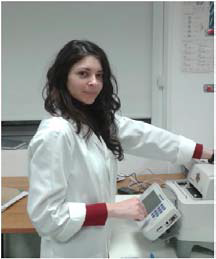Nowadays, there is a growing interest in developing novel foods containing probiotic microorganisms. Probiotics are commonly defined as viable microorganisms which, when administered in adequate amounts, confer a health benefit on the host. Most probiotic microorganisms belong to the genus Lactobacillus and Bifidobacterium and are used for the production of fermented milk products.
Probiotics should be able to survive the acidic conditions of the upper gastro-intestinal (GI) tract, be resistant to bile salts and proliferate and colonize in the gut. To induce the health effects, probiotics need to contain an adequate amount of live bacteria (at least 107cfu/g), in order to assure a daily intake of 109 probiotic cells, a requirement that is not always fulfilled. However, for certain strains, a lower concentration may be adequate. As a consequence, the daily suggested dose can be achieved by administration of 100g of a food product containing 107 cfu/g probiotic cells.
A properly designed strategy for incorporation of probiotics into foods is a key factor for maintaining such high concentration, especially at the moment of consumption. Even if a high content of probiotic cells is technological feasible, the cells should remain viable during the product’s shelf-life. This requirement constitutes the main reason that the commercially available probiotic foods are restricted to refrigerated products.
It has been established that cell immobilization enhances the viability of cultures. Cell immobilization on prebiotic supports and the use of the immobilized cells constitutes a challenge for food industry today.
In this context, iFUNFoods project aims at the production of innovative foods with immobilized lactic acid bacteria (LAB) on natural prebiotic supports (dried nuts, cereals, fruits, etc) and study of their potential health effects on humans and is implemented under 7 Work Modules (Figure 1).It is therefore an ambitious 3-year research project focusing on scaling up innovative technological processes for the production of probiotic ingredients, evaluating their efficacy using animal models and confirming their beneficial properties by clinical trials. It is an integrated approach, aiming at isolating 'wild' type lactic acid bacteria from biological samples, such as traditionally fermented foods, evaluating and characterizing their potential health effects and then developing, evaluating and producing viable symbiotic food ingredients that will be able to enhance the viability of the probiotic strains, acting, thus, beneficially to the human health.

Figure 1. Structure of Work Modules.
Expected Results
Τhe project is expected to contribute to the isolation of new 'wild' type health-promoting lactic acid bacteria strains, the development of novel functional symbiotic ingredients suitable for use by the food industry, the validation of a biotechnological process for the industrial production of symbiotic ingredients, the enhancement of knowledge of the properties, benefits and production processes of probiotic micro-organisms, as well as enhancing the research, innovation and cooperation viewpoint between research organizations and the industry.
The Research Group
DEMOCRITUS UNIVERSITY OF THRACE, DEPARTMENT OF MOLECULAR BIOLOGY & GENETICS, LABORATORY OF APPLIED MICROBIOLOGY & BIOTECHNOLOGY
 |
Kourkoutas Yiannis
|
||||||
|
|
Dimitrellou Dimitra
|
||||||
 |
Santarmaki Valentini
|
||||||
 |
Somalou Paraskevi
|
CENTRE FOR RESEARCH & TECHNOLOGY INSTITUTE OF APPLIED BIOSCIENCES
 |
Argiriou Anagnostis Researcher, Institute of Applied Biosciences, CERTH |
UNIVERSITY OF CRETE, MEDICAL SCHOOL
 |
Tsatsanis Christos
|
 |
Ieronymaki Eleftheria
|
KYKLOS PIOTITAS (QLC)
 |
Panas Panayiotis
|
Budget
952.434,78€
European Fund
European Regional Development Fund

Related projects
-
Project: RIS3-Region of Western Greece-Agro-Nutrition: ΔΕΡ6-0022891: “Development of novel functional foods exploiting health-promoting microorganisms”.
Source of funding: Region of Western Greece.
Budget: 240.000,00€.
Starting/ending dates: December 2018 - December 2020.
-
Project: FOOD INNOVATION RI: Research Infrastructure of the Development of Food Bioprocesses and Innovation Exploitation. Operational Program Competitiveness, Entrepreneurship and Innovation (EPAnEK).
Source of funding: Greek General Secretariat of Research and Technology (GSRT).
Budget:3.000.000,00€.
Starting/ending dates: November 2018 - October 2021.
-
Project: OPENSCREEN-GR: An Open-Access Research Infrastructure of Target-Based Screening Technologies and Chemical Biology for Human and Animal Health, Agriculture and Environment. Operational Program Competitiveness, Entrepreneurship and Innovation (EPAnEK).
Source of funding: Greek General Secretariat of Research and Technology (GSRT).
Budget: 3.025.090,09€.
Starting/ending dates: December 2017 - January 2021.
-
Project: OMIC-ENGINE: Synthetic biology: From omics technologies to genomic engineering. Operational Program Competitiveness, Entrepreneurship and Innovation (EPAnEK).
Source of funding: Greek General Secretariat of Research and Technology (GSRT).
Budget: 4.000.000,00 €.
Starting/ending dates: January 2018 -May 2021.




